LLBP2205 Land Law Assignment: Property Rights and Interests Analysis
VerifiedAdded on 2022/10/12
|9
|2480
|363
Homework Assignment
AI Summary
This Land Law assignment solution analyzes a scenario involving property rights, option agreements, and potential interests in land. The case revolves around Rashid and the rights of Saleem and Malik. The document discusses the Land Registration Act 2002, option agreements, and relevant case law like Teekay Tankers vs. STX Offshore & Shipbuilding, Rowland vs. Devall, and Sparks vs. Biden. It examines the implications of breaches of contract, deeds of variation, and the creation of easements. The assignment considers the validity of option agreements, the impact of subsequent transactions, and the potential claims of Saleem and Malik. It explores the consequences of Imran's actions, including selling the property to Khalid and Rashid, and the relevance of Malik's loan and potential interest in the farm. The solution also considers the implications of the cottage and farming land, and how the principles of land law would apply to the situation.
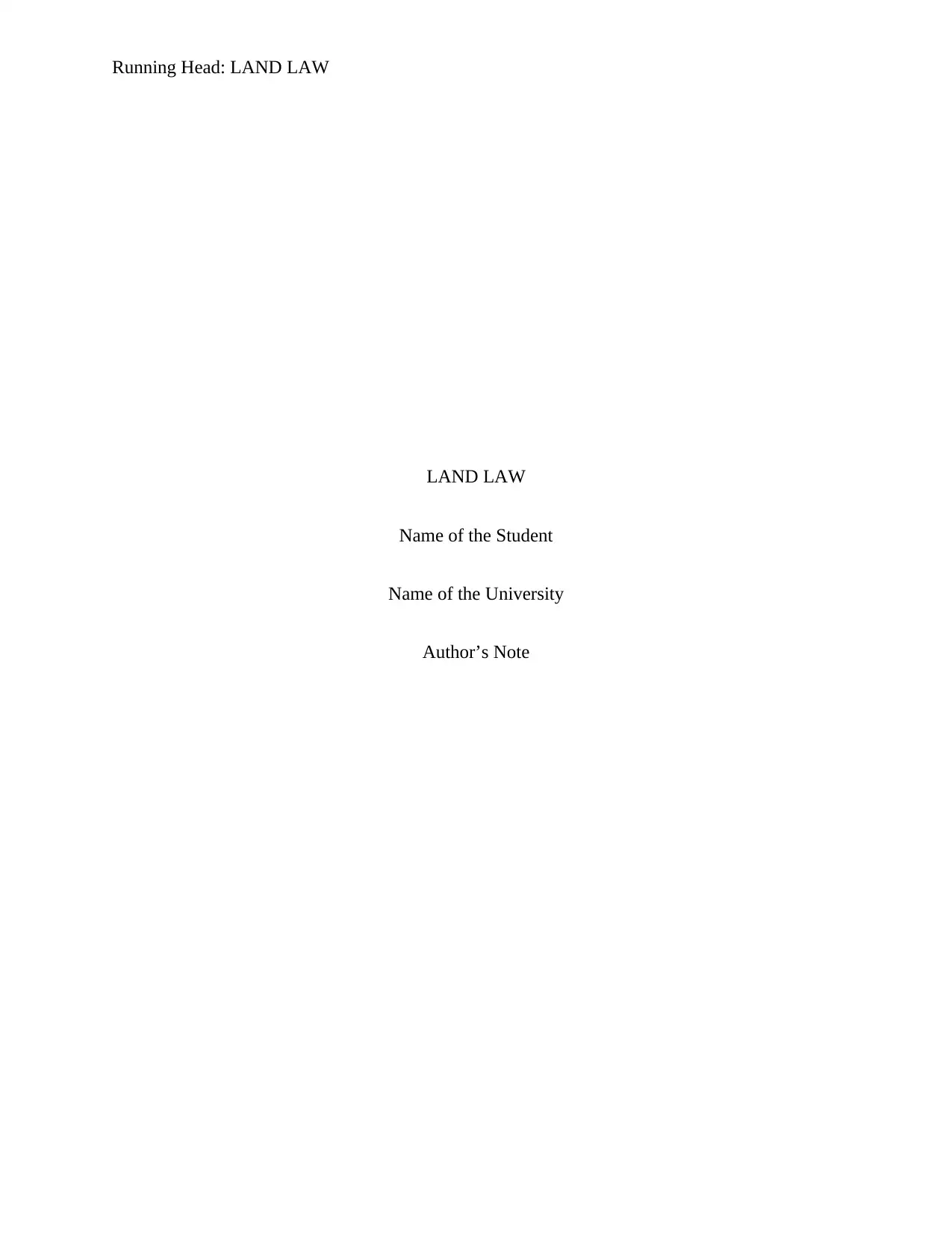
Running Head: LAND LAW
LAND LAW
Name of the Student
Name of the University
Author’s Note
LAND LAW
Name of the Student
Name of the University
Author’s Note
Paraphrase This Document
Need a fresh take? Get an instant paraphrase of this document with our AI Paraphraser
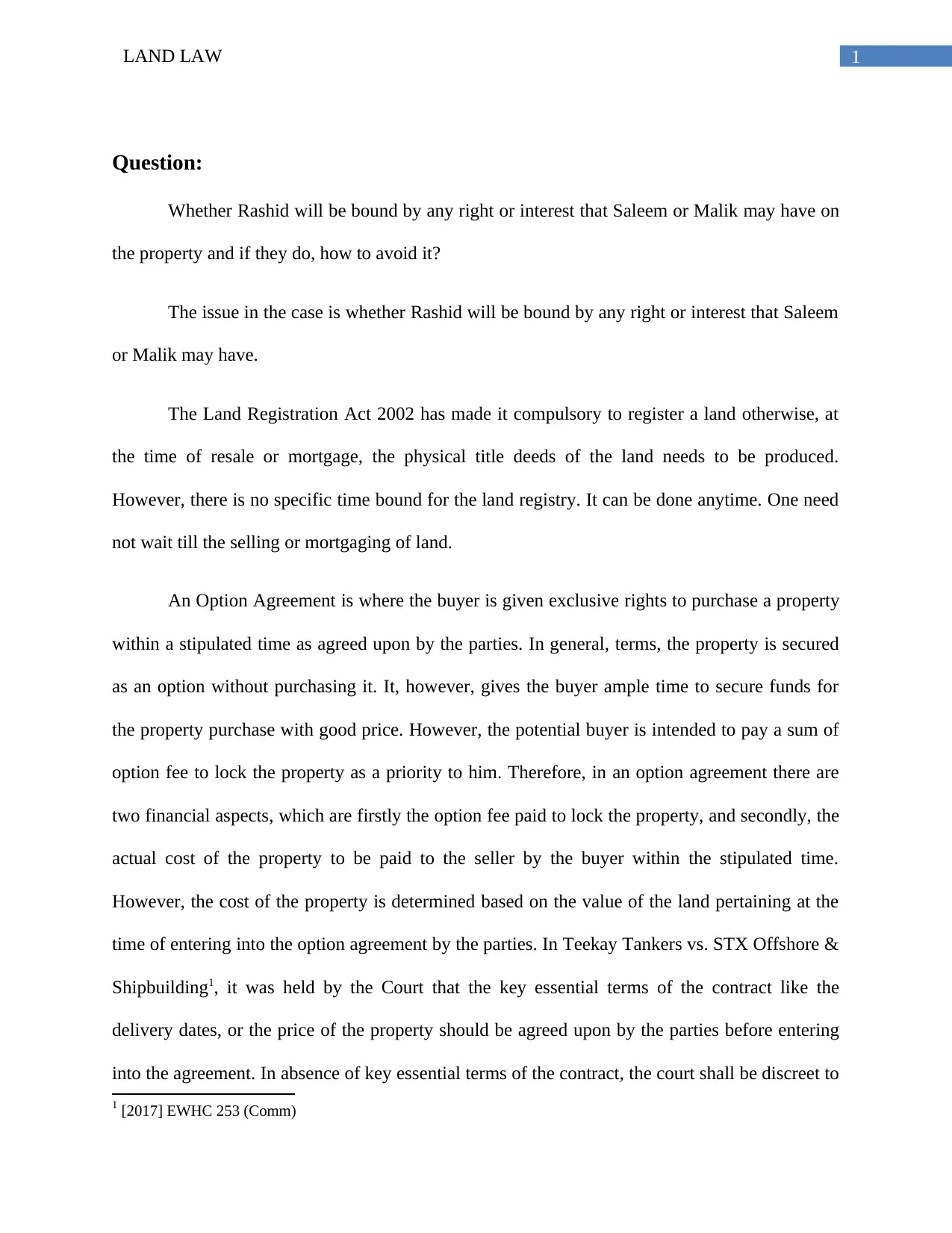
1LAND LAW
Question:
Whether Rashid will be bound by any right or interest that Saleem or Malik may have on
the property and if they do, how to avoid it?
The issue in the case is whether Rashid will be bound by any right or interest that Saleem
or Malik may have.
The Land Registration Act 2002 has made it compulsory to register a land otherwise, at
the time of resale or mortgage, the physical title deeds of the land needs to be produced.
However, there is no specific time bound for the land registry. It can be done anytime. One need
not wait till the selling or mortgaging of land.
An Option Agreement is where the buyer is given exclusive rights to purchase a property
within a stipulated time as agreed upon by the parties. In general, terms, the property is secured
as an option without purchasing it. It, however, gives the buyer ample time to secure funds for
the property purchase with good price. However, the potential buyer is intended to pay a sum of
option fee to lock the property as a priority to him. Therefore, in an option agreement there are
two financial aspects, which are firstly the option fee paid to lock the property, and secondly, the
actual cost of the property to be paid to the seller by the buyer within the stipulated time.
However, the cost of the property is determined based on the value of the land pertaining at the
time of entering into the option agreement by the parties. In Teekay Tankers vs. STX Offshore &
Shipbuilding1, it was held by the Court that the key essential terms of the contract like the
delivery dates, or the price of the property should be agreed upon by the parties before entering
into the agreement. In absence of key essential terms of the contract, the court shall be discreet to
1 [2017] EWHC 253 (Comm)
Question:
Whether Rashid will be bound by any right or interest that Saleem or Malik may have on
the property and if they do, how to avoid it?
The issue in the case is whether Rashid will be bound by any right or interest that Saleem
or Malik may have.
The Land Registration Act 2002 has made it compulsory to register a land otherwise, at
the time of resale or mortgage, the physical title deeds of the land needs to be produced.
However, there is no specific time bound for the land registry. It can be done anytime. One need
not wait till the selling or mortgaging of land.
An Option Agreement is where the buyer is given exclusive rights to purchase a property
within a stipulated time as agreed upon by the parties. In general, terms, the property is secured
as an option without purchasing it. It, however, gives the buyer ample time to secure funds for
the property purchase with good price. However, the potential buyer is intended to pay a sum of
option fee to lock the property as a priority to him. Therefore, in an option agreement there are
two financial aspects, which are firstly the option fee paid to lock the property, and secondly, the
actual cost of the property to be paid to the seller by the buyer within the stipulated time.
However, the cost of the property is determined based on the value of the land pertaining at the
time of entering into the option agreement by the parties. In Teekay Tankers vs. STX Offshore &
Shipbuilding1, it was held by the Court that the key essential terms of the contract like the
delivery dates, or the price of the property should be agreed upon by the parties before entering
into the agreement. In absence of key essential terms of the contract, the court shall be discreet to
1 [2017] EWHC 253 (Comm)
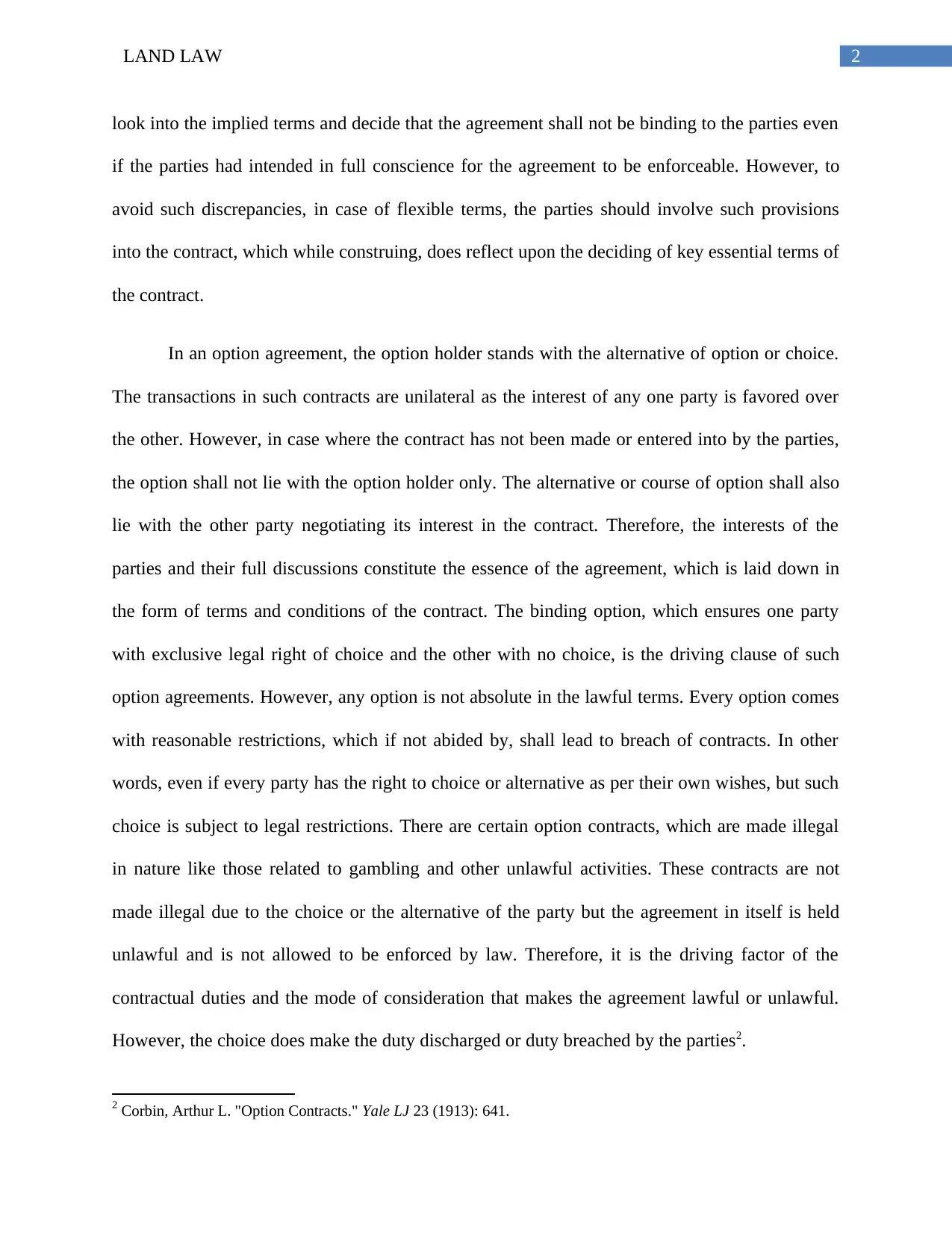
2LAND LAW
look into the implied terms and decide that the agreement shall not be binding to the parties even
if the parties had intended in full conscience for the agreement to be enforceable. However, to
avoid such discrepancies, in case of flexible terms, the parties should involve such provisions
into the contract, which while construing, does reflect upon the deciding of key essential terms of
the contract.
In an option agreement, the option holder stands with the alternative of option or choice.
The transactions in such contracts are unilateral as the interest of any one party is favored over
the other. However, in case where the contract has not been made or entered into by the parties,
the option shall not lie with the option holder only. The alternative or course of option shall also
lie with the other party negotiating its interest in the contract. Therefore, the interests of the
parties and their full discussions constitute the essence of the agreement, which is laid down in
the form of terms and conditions of the contract. The binding option, which ensures one party
with exclusive legal right of choice and the other with no choice, is the driving clause of such
option agreements. However, any option is not absolute in the lawful terms. Every option comes
with reasonable restrictions, which if not abided by, shall lead to breach of contracts. In other
words, even if every party has the right to choice or alternative as per their own wishes, but such
choice is subject to legal restrictions. There are certain option contracts, which are made illegal
in nature like those related to gambling and other unlawful activities. These contracts are not
made illegal due to the choice or the alternative of the party but the agreement in itself is held
unlawful and is not allowed to be enforced by law. Therefore, it is the driving factor of the
contractual duties and the mode of consideration that makes the agreement lawful or unlawful.
However, the choice does make the duty discharged or duty breached by the parties2.
2 Corbin, Arthur L. "Option Contracts." Yale LJ 23 (1913): 641.
look into the implied terms and decide that the agreement shall not be binding to the parties even
if the parties had intended in full conscience for the agreement to be enforceable. However, to
avoid such discrepancies, in case of flexible terms, the parties should involve such provisions
into the contract, which while construing, does reflect upon the deciding of key essential terms of
the contract.
In an option agreement, the option holder stands with the alternative of option or choice.
The transactions in such contracts are unilateral as the interest of any one party is favored over
the other. However, in case where the contract has not been made or entered into by the parties,
the option shall not lie with the option holder only. The alternative or course of option shall also
lie with the other party negotiating its interest in the contract. Therefore, the interests of the
parties and their full discussions constitute the essence of the agreement, which is laid down in
the form of terms and conditions of the contract. The binding option, which ensures one party
with exclusive legal right of choice and the other with no choice, is the driving clause of such
option agreements. However, any option is not absolute in the lawful terms. Every option comes
with reasonable restrictions, which if not abided by, shall lead to breach of contracts. In other
words, even if every party has the right to choice or alternative as per their own wishes, but such
choice is subject to legal restrictions. There are certain option contracts, which are made illegal
in nature like those related to gambling and other unlawful activities. These contracts are not
made illegal due to the choice or the alternative of the party but the agreement in itself is held
unlawful and is not allowed to be enforced by law. Therefore, it is the driving factor of the
contractual duties and the mode of consideration that makes the agreement lawful or unlawful.
However, the choice does make the duty discharged or duty breached by the parties2.
2 Corbin, Arthur L. "Option Contracts." Yale LJ 23 (1913): 641.
⊘ This is a preview!⊘
Do you want full access?
Subscribe today to unlock all pages.

Trusted by 1+ million students worldwide
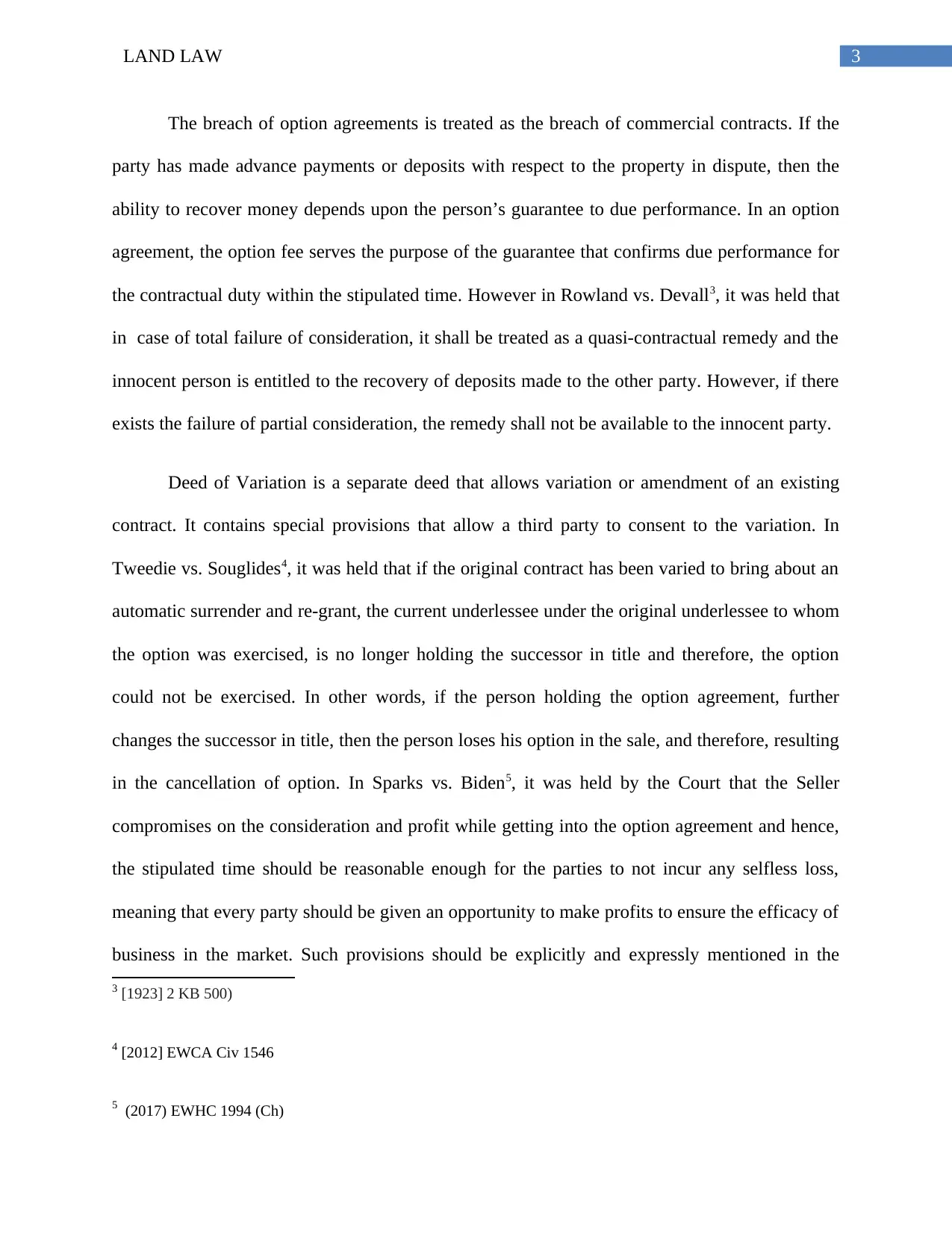
3LAND LAW
The breach of option agreements is treated as the breach of commercial contracts. If the
party has made advance payments or deposits with respect to the property in dispute, then the
ability to recover money depends upon the person’s guarantee to due performance. In an option
agreement, the option fee serves the purpose of the guarantee that confirms due performance for
the contractual duty within the stipulated time. However in Rowland vs. Devall3, it was held that
in case of total failure of consideration, it shall be treated as a quasi-contractual remedy and the
innocent person is entitled to the recovery of deposits made to the other party. However, if there
exists the failure of partial consideration, the remedy shall not be available to the innocent party.
Deed of Variation is a separate deed that allows variation or amendment of an existing
contract. It contains special provisions that allow a third party to consent to the variation. In
Tweedie vs. Souglides4, it was held that if the original contract has been varied to bring about an
automatic surrender and re-grant, the current underlessee under the original underlessee to whom
the option was exercised, is no longer holding the successor in title and therefore, the option
could not be exercised. In other words, if the person holding the option agreement, further
changes the successor in title, then the person loses his option in the sale, and therefore, resulting
in the cancellation of option. In Sparks vs. Biden5, it was held by the Court that the Seller
compromises on the consideration and profit while getting into the option agreement and hence,
the stipulated time should be reasonable enough for the parties to not incur any selfless loss,
meaning that every party should be given an opportunity to make profits to ensure the efficacy of
business in the market. Such provisions should be explicitly and expressly mentioned in the
3 [1923] 2 KB 500)
4 [2012] EWCA Civ 1546
5 (2017) EWHC 1994 (Ch)
The breach of option agreements is treated as the breach of commercial contracts. If the
party has made advance payments or deposits with respect to the property in dispute, then the
ability to recover money depends upon the person’s guarantee to due performance. In an option
agreement, the option fee serves the purpose of the guarantee that confirms due performance for
the contractual duty within the stipulated time. However in Rowland vs. Devall3, it was held that
in case of total failure of consideration, it shall be treated as a quasi-contractual remedy and the
innocent person is entitled to the recovery of deposits made to the other party. However, if there
exists the failure of partial consideration, the remedy shall not be available to the innocent party.
Deed of Variation is a separate deed that allows variation or amendment of an existing
contract. It contains special provisions that allow a third party to consent to the variation. In
Tweedie vs. Souglides4, it was held that if the original contract has been varied to bring about an
automatic surrender and re-grant, the current underlessee under the original underlessee to whom
the option was exercised, is no longer holding the successor in title and therefore, the option
could not be exercised. In other words, if the person holding the option agreement, further
changes the successor in title, then the person loses his option in the sale, and therefore, resulting
in the cancellation of option. In Sparks vs. Biden5, it was held by the Court that the Seller
compromises on the consideration and profit while getting into the option agreement and hence,
the stipulated time should be reasonable enough for the parties to not incur any selfless loss,
meaning that every party should be given an opportunity to make profits to ensure the efficacy of
business in the market. Such provisions should be explicitly and expressly mentioned in the
3 [1923] 2 KB 500)
4 [2012] EWCA Civ 1546
5 (2017) EWHC 1994 (Ch)
Paraphrase This Document
Need a fresh take? Get an instant paraphrase of this document with our AI Paraphraser
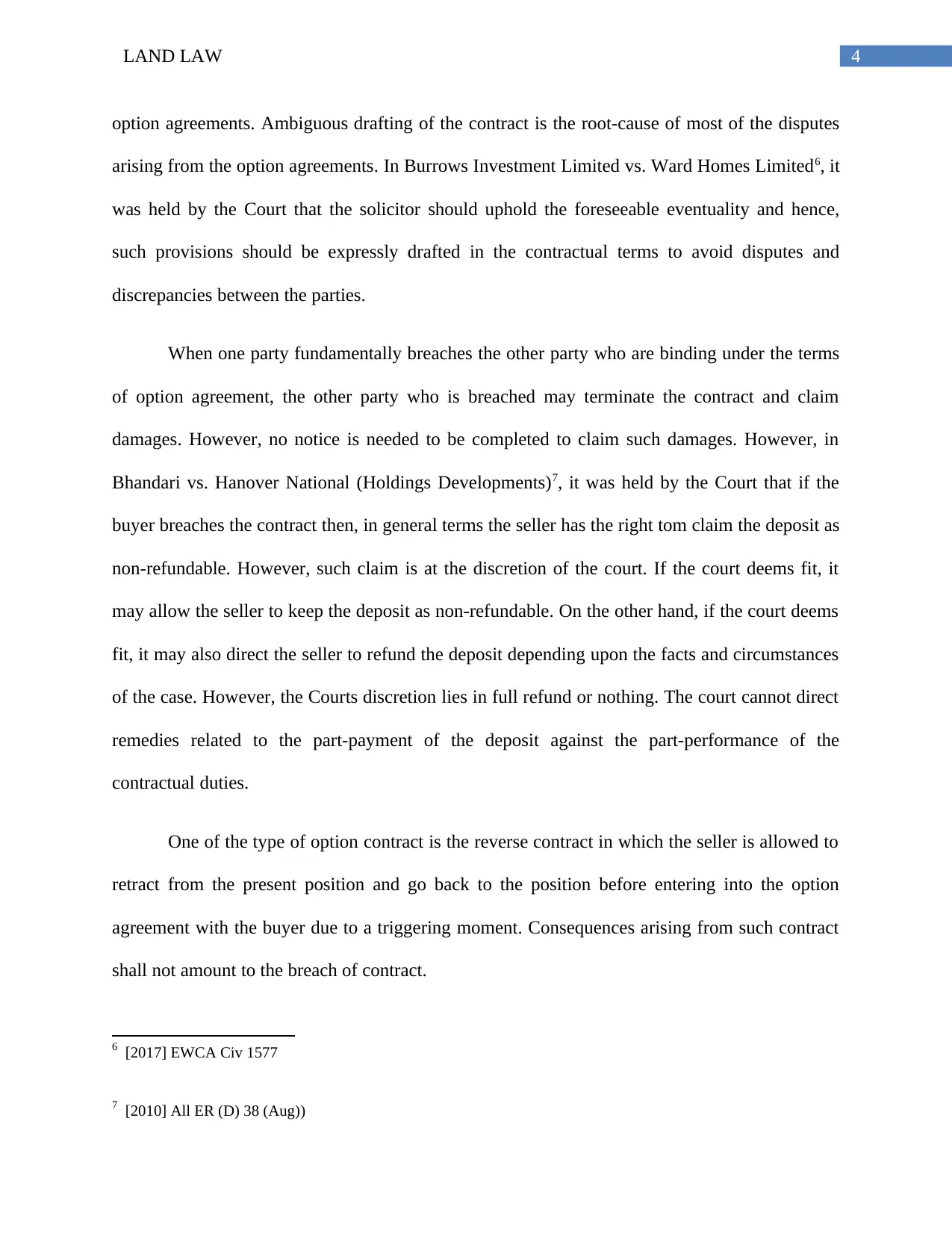
4LAND LAW
option agreements. Ambiguous drafting of the contract is the root-cause of most of the disputes
arising from the option agreements. In Burrows Investment Limited vs. Ward Homes Limited6, it
was held by the Court that the solicitor should uphold the foreseeable eventuality and hence,
such provisions should be expressly drafted in the contractual terms to avoid disputes and
discrepancies between the parties.
When one party fundamentally breaches the other party who are binding under the terms
of option agreement, the other party who is breached may terminate the contract and claim
damages. However, no notice is needed to be completed to claim such damages. However, in
Bhandari vs. Hanover National (Holdings Developments)7, it was held by the Court that if the
buyer breaches the contract then, in general terms the seller has the right tom claim the deposit as
non-refundable. However, such claim is at the discretion of the court. If the court deems fit, it
may allow the seller to keep the deposit as non-refundable. On the other hand, if the court deems
fit, it may also direct the seller to refund the deposit depending upon the facts and circumstances
of the case. However, the Courts discretion lies in full refund or nothing. The court cannot direct
remedies related to the part-payment of the deposit against the part-performance of the
contractual duties.
One of the type of option contract is the reverse contract in which the seller is allowed to
retract from the present position and go back to the position before entering into the option
agreement with the buyer due to a triggering moment. Consequences arising from such contract
shall not amount to the breach of contract.
6 [2017] EWCA Civ 1577
7 [2010] All ER (D) 38 (Aug))
option agreements. Ambiguous drafting of the contract is the root-cause of most of the disputes
arising from the option agreements. In Burrows Investment Limited vs. Ward Homes Limited6, it
was held by the Court that the solicitor should uphold the foreseeable eventuality and hence,
such provisions should be expressly drafted in the contractual terms to avoid disputes and
discrepancies between the parties.
When one party fundamentally breaches the other party who are binding under the terms
of option agreement, the other party who is breached may terminate the contract and claim
damages. However, no notice is needed to be completed to claim such damages. However, in
Bhandari vs. Hanover National (Holdings Developments)7, it was held by the Court that if the
buyer breaches the contract then, in general terms the seller has the right tom claim the deposit as
non-refundable. However, such claim is at the discretion of the court. If the court deems fit, it
may allow the seller to keep the deposit as non-refundable. On the other hand, if the court deems
fit, it may also direct the seller to refund the deposit depending upon the facts and circumstances
of the case. However, the Courts discretion lies in full refund or nothing. The court cannot direct
remedies related to the part-payment of the deposit against the part-performance of the
contractual duties.
One of the type of option contract is the reverse contract in which the seller is allowed to
retract from the present position and go back to the position before entering into the option
agreement with the buyer due to a triggering moment. Consequences arising from such contract
shall not amount to the breach of contract.
6 [2017] EWCA Civ 1577
7 [2010] All ER (D) 38 (Aug))
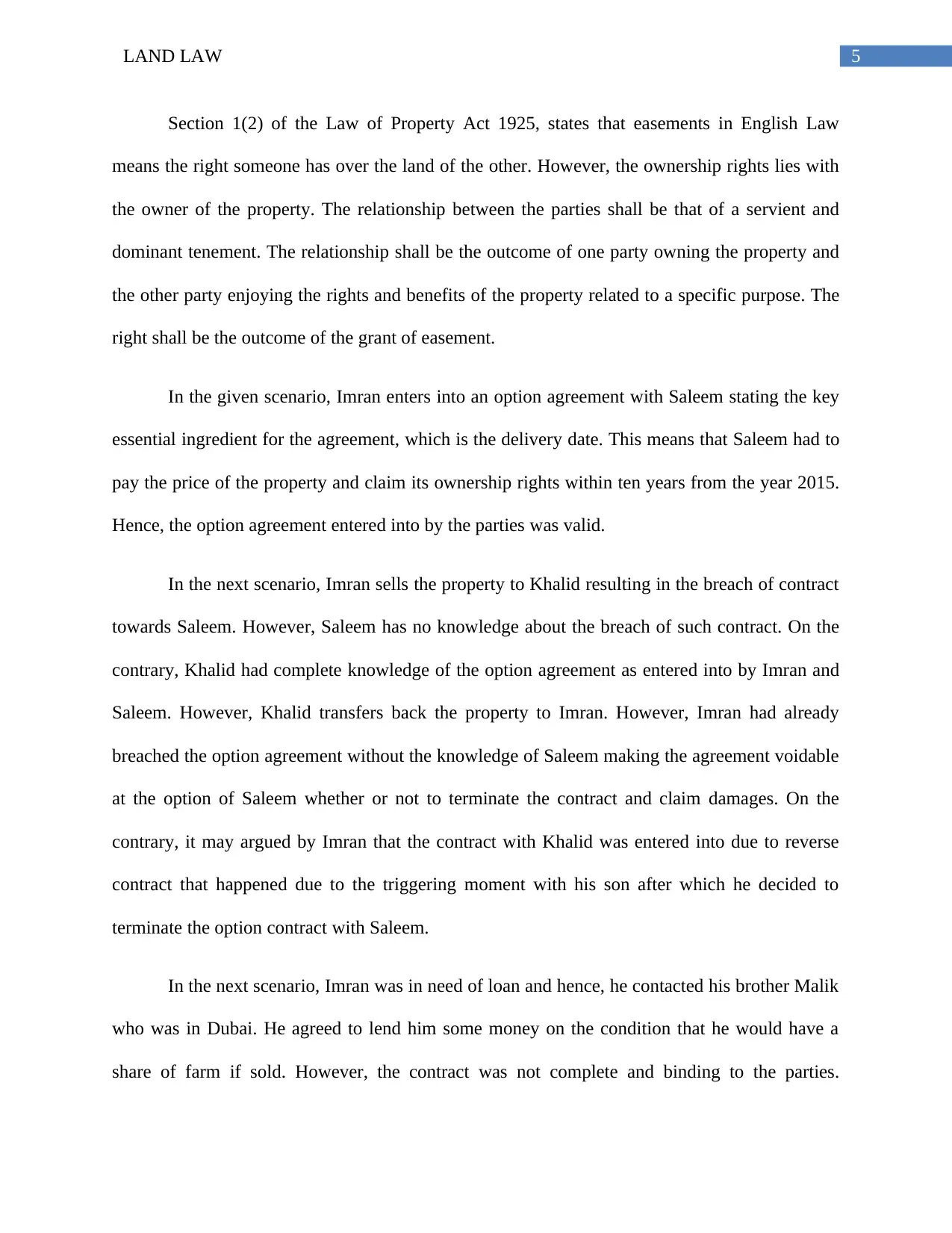
5LAND LAW
Section 1(2) of the Law of Property Act 1925, states that easements in English Law
means the right someone has over the land of the other. However, the ownership rights lies with
the owner of the property. The relationship between the parties shall be that of a servient and
dominant tenement. The relationship shall be the outcome of one party owning the property and
the other party enjoying the rights and benefits of the property related to a specific purpose. The
right shall be the outcome of the grant of easement.
In the given scenario, Imran enters into an option agreement with Saleem stating the key
essential ingredient for the agreement, which is the delivery date. This means that Saleem had to
pay the price of the property and claim its ownership rights within ten years from the year 2015.
Hence, the option agreement entered into by the parties was valid.
In the next scenario, Imran sells the property to Khalid resulting in the breach of contract
towards Saleem. However, Saleem has no knowledge about the breach of such contract. On the
contrary, Khalid had complete knowledge of the option agreement as entered into by Imran and
Saleem. However, Khalid transfers back the property to Imran. However, Imran had already
breached the option agreement without the knowledge of Saleem making the agreement voidable
at the option of Saleem whether or not to terminate the contract and claim damages. On the
contrary, it may argued by Imran that the contract with Khalid was entered into due to reverse
contract that happened due to the triggering moment with his son after which he decided to
terminate the option contract with Saleem.
In the next scenario, Imran was in need of loan and hence, he contacted his brother Malik
who was in Dubai. He agreed to lend him some money on the condition that he would have a
share of farm if sold. However, the contract was not complete and binding to the parties.
Section 1(2) of the Law of Property Act 1925, states that easements in English Law
means the right someone has over the land of the other. However, the ownership rights lies with
the owner of the property. The relationship between the parties shall be that of a servient and
dominant tenement. The relationship shall be the outcome of one party owning the property and
the other party enjoying the rights and benefits of the property related to a specific purpose. The
right shall be the outcome of the grant of easement.
In the given scenario, Imran enters into an option agreement with Saleem stating the key
essential ingredient for the agreement, which is the delivery date. This means that Saleem had to
pay the price of the property and claim its ownership rights within ten years from the year 2015.
Hence, the option agreement entered into by the parties was valid.
In the next scenario, Imran sells the property to Khalid resulting in the breach of contract
towards Saleem. However, Saleem has no knowledge about the breach of such contract. On the
contrary, Khalid had complete knowledge of the option agreement as entered into by Imran and
Saleem. However, Khalid transfers back the property to Imran. However, Imran had already
breached the option agreement without the knowledge of Saleem making the agreement voidable
at the option of Saleem whether or not to terminate the contract and claim damages. On the
contrary, it may argued by Imran that the contract with Khalid was entered into due to reverse
contract that happened due to the triggering moment with his son after which he decided to
terminate the option contract with Saleem.
In the next scenario, Imran was in need of loan and hence, he contacted his brother Malik
who was in Dubai. He agreed to lend him some money on the condition that he would have a
share of farm if sold. However, the contract was not complete and binding to the parties.
⊘ This is a preview!⊘
Do you want full access?
Subscribe today to unlock all pages.

Trusted by 1+ million students worldwide
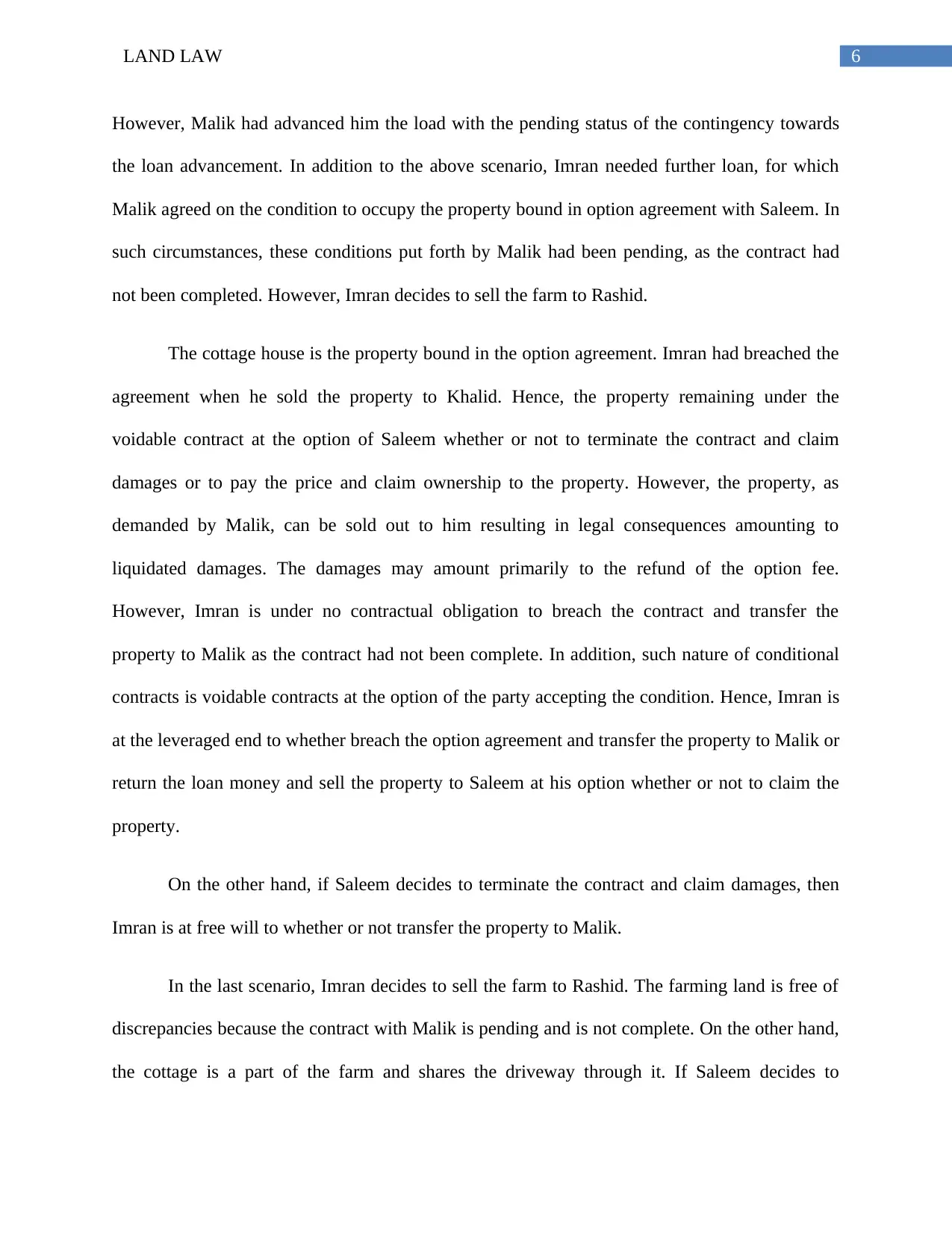
6LAND LAW
However, Malik had advanced him the load with the pending status of the contingency towards
the loan advancement. In addition to the above scenario, Imran needed further loan, for which
Malik agreed on the condition to occupy the property bound in option agreement with Saleem. In
such circumstances, these conditions put forth by Malik had been pending, as the contract had
not been completed. However, Imran decides to sell the farm to Rashid.
The cottage house is the property bound in the option agreement. Imran had breached the
agreement when he sold the property to Khalid. Hence, the property remaining under the
voidable contract at the option of Saleem whether or not to terminate the contract and claim
damages or to pay the price and claim ownership to the property. However, the property, as
demanded by Malik, can be sold out to him resulting in legal consequences amounting to
liquidated damages. The damages may amount primarily to the refund of the option fee.
However, Imran is under no contractual obligation to breach the contract and transfer the
property to Malik as the contract had not been complete. In addition, such nature of conditional
contracts is voidable contracts at the option of the party accepting the condition. Hence, Imran is
at the leveraged end to whether breach the option agreement and transfer the property to Malik or
return the loan money and sell the property to Saleem at his option whether or not to claim the
property.
On the other hand, if Saleem decides to terminate the contract and claim damages, then
Imran is at free will to whether or not transfer the property to Malik.
In the last scenario, Imran decides to sell the farm to Rashid. The farming land is free of
discrepancies because the contract with Malik is pending and is not complete. On the other hand,
the cottage is a part of the farm and shares the driveway through it. If Saleem decides to
However, Malik had advanced him the load with the pending status of the contingency towards
the loan advancement. In addition to the above scenario, Imran needed further loan, for which
Malik agreed on the condition to occupy the property bound in option agreement with Saleem. In
such circumstances, these conditions put forth by Malik had been pending, as the contract had
not been completed. However, Imran decides to sell the farm to Rashid.
The cottage house is the property bound in the option agreement. Imran had breached the
agreement when he sold the property to Khalid. Hence, the property remaining under the
voidable contract at the option of Saleem whether or not to terminate the contract and claim
damages or to pay the price and claim ownership to the property. However, the property, as
demanded by Malik, can be sold out to him resulting in legal consequences amounting to
liquidated damages. The damages may amount primarily to the refund of the option fee.
However, Imran is under no contractual obligation to breach the contract and transfer the
property to Malik as the contract had not been complete. In addition, such nature of conditional
contracts is voidable contracts at the option of the party accepting the condition. Hence, Imran is
at the leveraged end to whether breach the option agreement and transfer the property to Malik or
return the loan money and sell the property to Saleem at his option whether or not to claim the
property.
On the other hand, if Saleem decides to terminate the contract and claim damages, then
Imran is at free will to whether or not transfer the property to Malik.
In the last scenario, Imran decides to sell the farm to Rashid. The farming land is free of
discrepancies because the contract with Malik is pending and is not complete. On the other hand,
the cottage is a part of the farm and shares the driveway through it. If Saleem decides to
Paraphrase This Document
Need a fresh take? Get an instant paraphrase of this document with our AI Paraphraser
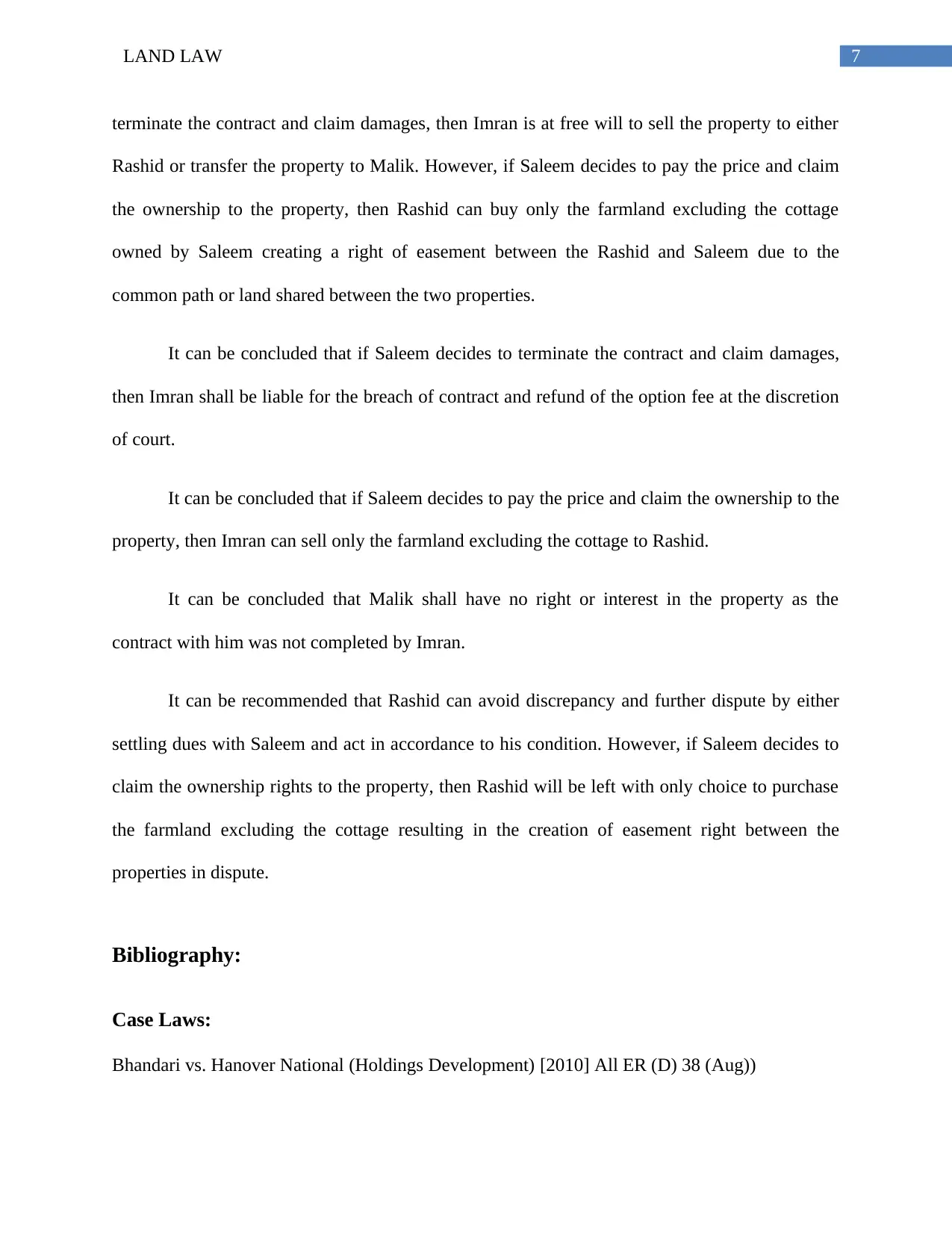
7LAND LAW
terminate the contract and claim damages, then Imran is at free will to sell the property to either
Rashid or transfer the property to Malik. However, if Saleem decides to pay the price and claim
the ownership to the property, then Rashid can buy only the farmland excluding the cottage
owned by Saleem creating a right of easement between the Rashid and Saleem due to the
common path or land shared between the two properties.
It can be concluded that if Saleem decides to terminate the contract and claim damages,
then Imran shall be liable for the breach of contract and refund of the option fee at the discretion
of court.
It can be concluded that if Saleem decides to pay the price and claim the ownership to the
property, then Imran can sell only the farmland excluding the cottage to Rashid.
It can be concluded that Malik shall have no right or interest in the property as the
contract with him was not completed by Imran.
It can be recommended that Rashid can avoid discrepancy and further dispute by either
settling dues with Saleem and act in accordance to his condition. However, if Saleem decides to
claim the ownership rights to the property, then Rashid will be left with only choice to purchase
the farmland excluding the cottage resulting in the creation of easement right between the
properties in dispute.
Bibliography:
Case Laws:
Bhandari vs. Hanover National (Holdings Development) [2010] All ER (D) 38 (Aug))
terminate the contract and claim damages, then Imran is at free will to sell the property to either
Rashid or transfer the property to Malik. However, if Saleem decides to pay the price and claim
the ownership to the property, then Rashid can buy only the farmland excluding the cottage
owned by Saleem creating a right of easement between the Rashid and Saleem due to the
common path or land shared between the two properties.
It can be concluded that if Saleem decides to terminate the contract and claim damages,
then Imran shall be liable for the breach of contract and refund of the option fee at the discretion
of court.
It can be concluded that if Saleem decides to pay the price and claim the ownership to the
property, then Imran can sell only the farmland excluding the cottage to Rashid.
It can be concluded that Malik shall have no right or interest in the property as the
contract with him was not completed by Imran.
It can be recommended that Rashid can avoid discrepancy and further dispute by either
settling dues with Saleem and act in accordance to his condition. However, if Saleem decides to
claim the ownership rights to the property, then Rashid will be left with only choice to purchase
the farmland excluding the cottage resulting in the creation of easement right between the
properties in dispute.
Bibliography:
Case Laws:
Bhandari vs. Hanover National (Holdings Development) [2010] All ER (D) 38 (Aug))
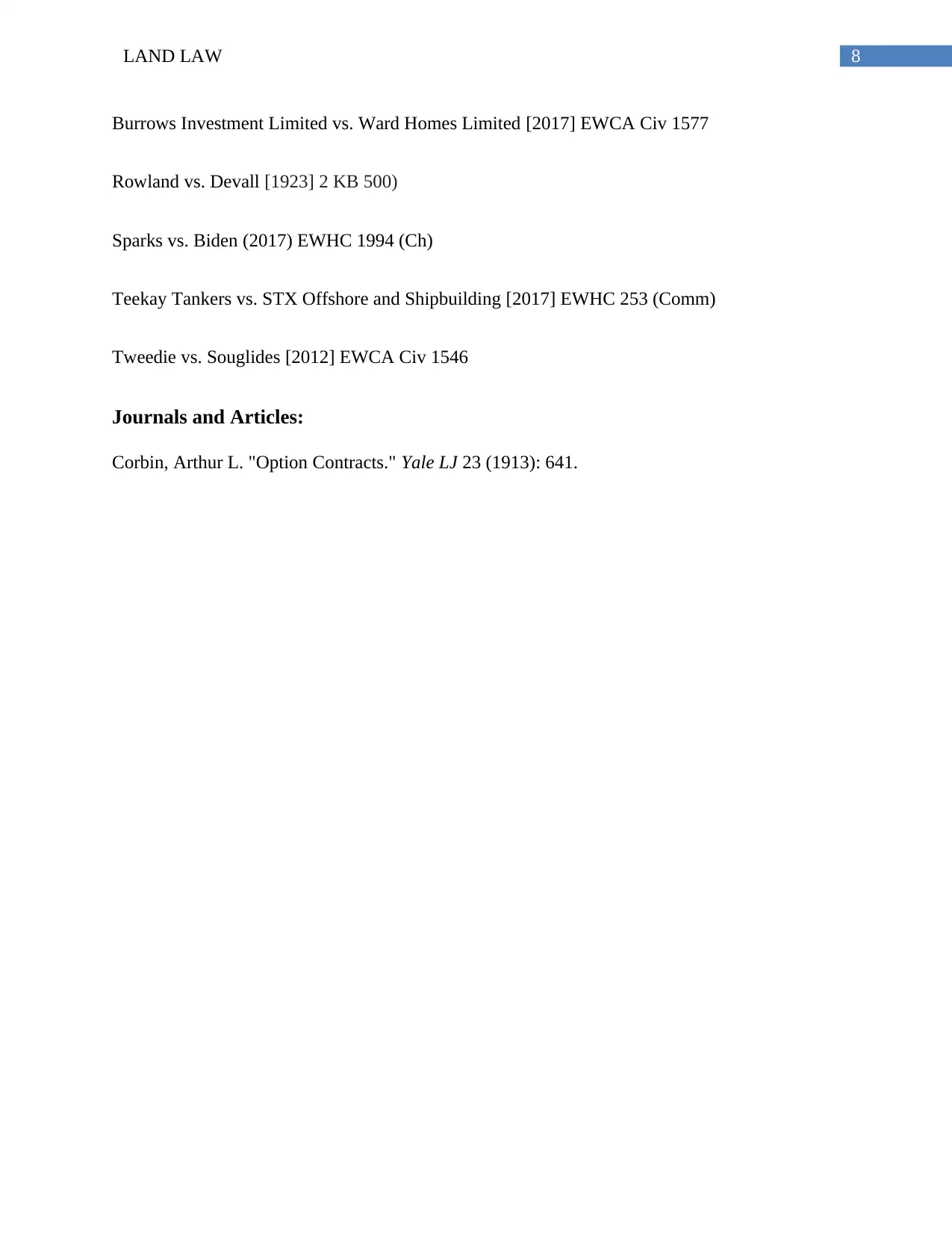
8LAND LAW
Burrows Investment Limited vs. Ward Homes Limited [2017] EWCA Civ 1577
Rowland vs. Devall [1923] 2 KB 500)
Sparks vs. Biden (2017) EWHC 1994 (Ch)
Teekay Tankers vs. STX Offshore and Shipbuilding [2017] EWHC 253 (Comm)
Tweedie vs. Souglides [2012] EWCA Civ 1546
Journals and Articles:
Corbin, Arthur L. "Option Contracts." Yale LJ 23 (1913): 641.
Burrows Investment Limited vs. Ward Homes Limited [2017] EWCA Civ 1577
Rowland vs. Devall [1923] 2 KB 500)
Sparks vs. Biden (2017) EWHC 1994 (Ch)
Teekay Tankers vs. STX Offshore and Shipbuilding [2017] EWHC 253 (Comm)
Tweedie vs. Souglides [2012] EWCA Civ 1546
Journals and Articles:
Corbin, Arthur L. "Option Contracts." Yale LJ 23 (1913): 641.
⊘ This is a preview!⊘
Do you want full access?
Subscribe today to unlock all pages.

Trusted by 1+ million students worldwide
1 out of 9
Related Documents
Your All-in-One AI-Powered Toolkit for Academic Success.
+13062052269
info@desklib.com
Available 24*7 on WhatsApp / Email
![[object Object]](/_next/static/media/star-bottom.7253800d.svg)
Unlock your academic potential
Copyright © 2020–2026 A2Z Services. All Rights Reserved. Developed and managed by ZUCOL.





